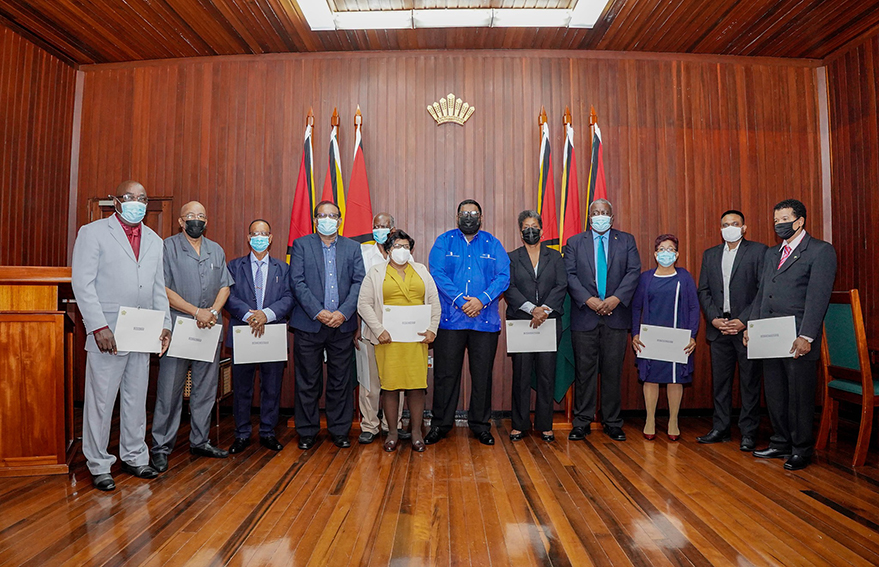The eight members of the new Local Government Commission (LGC) took their oath of office yesterday morning, paving the way for the body to resume oversight of local government organs across the country.
Those sworn in yesterday at the Office of the President were Clinton Collymore, Carol Sooba, and Norman Whittaker, who were nominated by the government, Clement Corlette, Joan-Ann Romascindo and Nicola Trotman, who were nominated by the opposition, and Carvil Duncan and Julius Faerber, who are representatives of the trade unions and local democratic organs, respectively. They will serve as commissioners over the next three years. The life of the first LGC expired in October 2020.
On the sidelines of the swearing in, President Irfaan Ali explained that Minister of Governance and Parliamentary Affairs Gail Teixeira facilitated consultations and in writing requested nominees for the commission from Opposition Leader Joseph Harmon. This is the first known formal consultation between the government and Harmon in his capacity as Opposition Leader.
Ali noted that the names were provided within 48 hours of the request.
According to the Local Government Commission Act, the commission shall consist of eight members: three appointed by the President acting in accordance with his own deliberate judgement; three members appointed by the President acting on the advice of the Leader of the Opposition after consultation with other parliamentary parties, one appointed by the President after approval by the National Assembly upon a nomination by the Parliamentary Standing Committee on Appointments from persons submitted by trade unions within the local government system, and one appointed by the minister after consultation with Local Democratic Organs.
Duncan, of the Guyana Labour Union (GLU), was proposed by the Committee on Appointments as the representative of trade unions. Sharon Smith and Vera Naughton were also nominated by the Guyana Local Government Officers Union and the Guyana Public Service Union, respectively.
Ali reminded members that the commission plays an integral role in the delivery of services by local government bodies and said he looks forward to it discharging its mandate with the highest levels of professionalism.
“Government is crafting policies to give effect to local development, and it values the important role which the LGC can play in ensuring that its policies and programmes are not retarded by obstructionism, poor implementation, and the absence of professionalism or by disputes between and within local government bodies,” he said.
The president also pointed out that his government is committed to advancing the aims and objectives of local government authorities and, specifically, to addressing the employment, transfer, disciplining, and dismissal of public officers within the local government system and the resolving of disputes within and between local government entities through the functioning of the Local Government Commission.
More resources
Ali also stressed that with Guyana being the fastest growing economy in the western hemisphere, there will be more resources distributed towards communities, creating economic and social transformation.
With this he said that local organs will have not only larger budgets but more responsibilities, hence there will be a need for greater oversight, professionalism and accountability, for which the Commission has responsibility.
“I assure you of the support of my administration and give you my personal guarantee that no attempt at interference with the discharge of your functions specified under the Constitution and the Local Government Commission Act will be tolerated,” Ali said.
The Commission’s mandate includes monitoring, evaluating and making recommendations on policies, procedures and practices of all local government organs; investigating any matter under its purview and proposing remedial action to the minister; and monitoring and reviewing all existing and proposed legislation, and or policies and measures relating to local government organs.
It has the power to deal with all matters relating to the staffing of local government organs and in particular it is “responsible for employment, transfer, discipline and dismissal of staff and approval of remuneration, superannuation, training, leave and promotion of staff”.
The LGC is also empowered to hear appeals instituted by employees who have been dismissed by local government organs and hear and determine disputes arising within a local government area or between any two local government organs.
Importantly, the LGC has the “…power to initiate and conduct investigations into the activities of any local government organ…”






